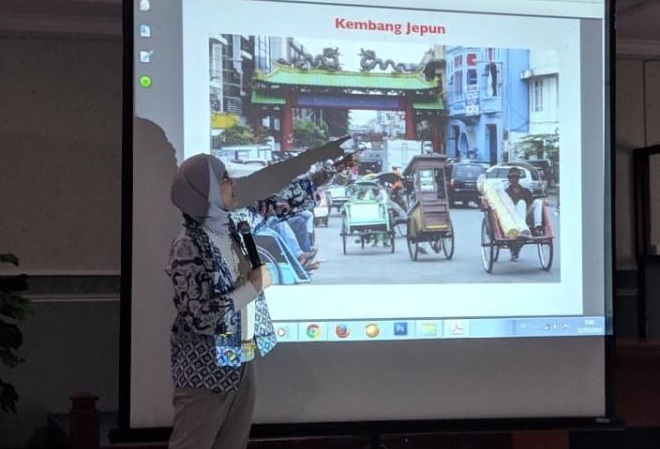UNAIR NEWS – Universitas Airlangga (UNAIR) Department of History (FIB) held a studium generale on Thursday, March 21, 2019. The program was part of Department of History’s 21st Anniversary.
The activity held in Siti Parwati Room, 2nd floor of FIB UNAIR was not only attended by UNAIR students, but also history science students from other universities, such as Surabaya State University (UNESA), Sunan Ampel (UINSA) State Islamic University, and STKIP Sidoarjo.
‘Japanese Community in Surabaya during the Indies Period’ was the topic and it was presented by Meta Sekar Puji Astuti, Ph.D., FIB lecturer at Hasanuddin University (Unhas), Makassar. Interestingly, Meta is from Japanese literary studies, who has an interest in history.
In the studium generale Meta said that Japanese people who entered Dutch East Indies in the past were about seven thousand people. Three thousands of them occupied East Java, and three hundred of them lived in Surabaya. It explains many Japanese communities in Surabaya.
She also said that not all invaders (Japan, ed) in the Dutch East Indies bring a bad impact. There is a good impact that can still be felt by Indonesian people to this day. One example is the presence of the Siola.
“In the first thirties (1930s, ed), Siola was the largest department store in Surabaya which was built by Japanese people. It was not called Siola, but Tjijoda. It was built by Okano Shigezo. He was a very rich person at that time, “added the author of Apakah Mereka Mata-Mata?.
In the end of the event, the gift was given by Dr. Sarkawi, S.S., M. Hum. as Head of Department of History UNAIR FIB to Meta and two students from Unhas. The two students were Meta’s students who are conducting historical research in Surabaya.
The Studium Generale was held as one of the steps to attract students’ interest in studying history in Indonesia. Seeing the lack of student literacy interest, it is hoped that these activities can provide more information about Indonesian history and opening the student mindset towards colonialism in the past that is not always detrimental. (*)
Author: Shofiyyatul Mahrushah
Editor: Binti Q. Masruroh





